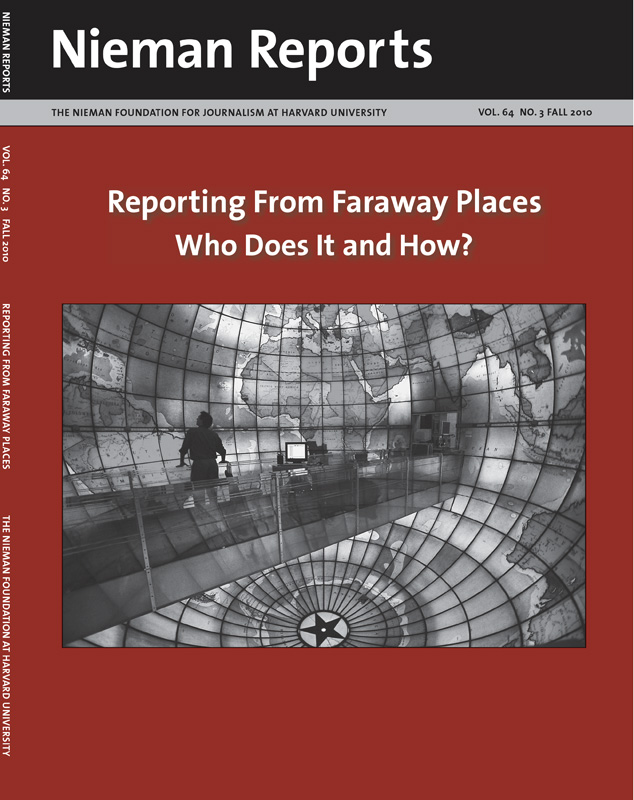Are Americans interested in international journalism? The usual response is that it’s an elite interest, if it exists at all. Like spinach, it may be good for you, but it’s not intrinsically attractive to a lot of people. I don’t agree. I’m convinced that there is a greater hunger for global information than is usually recognized.
This belief leaves me with two critical questions: What kind of information will entice and satisfy this appetite? And are journalists doing enough to provide it?
About 10 years ago I faced a similar conundrum at the BBC. As the editor of World Current Affairs Radio, one of the shows I oversaw was “Euronews,” the United Kingdom’s only daily information program about European affairs on Radio 5 Live, the BBC’s 24-hour news and sports network. As my colleagues liked to remind me, “Euronews” was the ultimate serving of spinach. Despite the fact that the show’s topics ranged from law and justice to culture and sports and well beyond European Union (EU) politics, we were up against the undeniable fact that too often “Europe” seemed synonymous with byzantine political machinations in the EU capital, Brussels—significant yes, but hard to understand and oh so foreign.
Survey after survey showed coverage of Europe stuck stubbornly at the bottom of the list of audience interests. After a while, I got fed up trying to justify the existence of “Euronews.” So one afternoon I slipped out of the office, audio recorder in hand, and engaged with the audience who allegedly weren’t engaging with us. For five hours I stopped people on London streets to ask them what, if anything, they wanted to know about Europe and Europeans.
What I heard was gratifying—and encouraging. They confirmed that EU politics were distant and boring, but then they told me how they wanted more storytelling about the daily lives and concerns of Italians, Germans and Poles. Most striking was their interest—raised repeatedly and without prompting—in what people in other European countries were doing about problems that affected all of us, problems like unemployment, illiteracy and what to do about the mountains of waste we produce.
Admittedly, my approach was unscientific and my sample size small, but what I heard that afternoon informed our editorial agenda from that day forward. Looking back, it was a crude form of crowdsourcing before that word existed. Comparisons between the United Kingdom and the rest of the EU became a regular feature not just of “Euronews,” but also of other programming for which I was responsible. On Radio 4, which is the UK’s leading news, speech and drama network, we launched a series of reports from continental Europe related to issues being debated at home. When there was controversy over “super casino” licenses in the United Kingdom, we went to France to tell the story of one gambling addict’s lawsuit against a casino owner. As British fishermen protested quotas imposed to counter overfishing, we reported how Norway revived its herring industry after overfishing almost killed it.
As we did this, we were breaking stories and broadcasting exclusive interviews. Soon, our colleagues across BBC radio and television were consulting us for our European expertise. Our programs were nominated for awards. Best of all was what the audience was telling us. A night watchman wrote to let us know that he was following European news for the first time. A Birmingham truck driver called in live to ask a Serb housewife in Belgrade and an Albanian baker refugee in Macedonia questions about the war in Kosovo. He wasn’t alone; when calls kept coming that day, we extended the segment to an hour.
We managed to broaden our audience, expand our coverage and—this is critical—not “dumb down” in the process. Out of this experience three clear lessons emerged:
- It’s the audience, stupid!
- Wider interest in international news exists than much of the mainstream media assume.
- To paraphrase my high school principal, “more humility, ladies and gents of the media!” The public’s lack of interest in international news could (just possibly) reflect the quality of our journalism rather than the topic itself.
The U.S. Experience
How relevant is any of this to what’s happening in the United States? At the very least it is ironic that at a time when news organizations have shut down foreign bureaus, a March 2010 Pew Research Center survey—“Understanding the Participatory News Consumer”—showed that about a third of Americans say they would like more international coverage. (The actual figures are 42 percent of “news participators,” defined by Pew as those who contribute to or share news online, and 28 percent of other adults.) This result is all the more remarkable given that never before has there been such quick and easy access to international news as there is now with digital media.
The message I take from the Pew findings is that people are still in search of a different kind of international coverage. Or perhaps I should say different kinds. The fact that “outsider” news providers like The Economist, the BBC, and its Boston-based co-production with Public Radio International, “The World,” are increasingly popular proves the demand is there—and I’d argue there is still plenty of room for fresh perspectives.
After all, places that once seemed faraway and foreign to most Americans are now part and parcel of their everyday lives. A nurse taking their blood pressure might have just returned from her family in Haiti made homeless by the earthquake. Their local supermarket sells goods not only from China but Central America and India and Eastern Europe. Language lessons with native speakers are now offered via the Internet so their child’s teacher might be in Beijing, Moscow or Sao Paulo.
International coverage too often fails to reflect—or take advantage of—the increasing networks of personal relationships that globalization enables. The ease and familiarity of these global connections speak, however, to the potential of a bottom-up approach to international journalism. And thanks to digital media we have tools to engage the audience as never before: We can call on their expertise; we can facilitate international debate; we can use crowdsourcing techniques to have them participate in deciding which stories to cover.
Consider, for example, the debate Americans had last year about reforming health care. Opponents of single-payer proposals made dire claims about the Canadian and British national health systems, but apart from a handful of good explanatory features about how these systems work (not to mention the French or Japanese systems) there was little sustained international context brought into the American debate. And yet the connections are there to be explored. Many American doctors have worked abroad; many foreign doctors have studied and worked in the United States. Insurance companies are global corporations, just as pharmaceutical companies are. Americans live everywhere and require medical care.
The American debate about health care does not exist in isolation. In almost every European country, this topic is the subject of passionate conversation at the pub, café and office. With my editor’s cap on, what I see in these connections are compelling stories capable of resonating with people who share the experience—whatever the nationality—of being sick or needing a doctor’s care.
These kinds of stories can offer insights that make the audience “wiser,” as New York University professor Mitchell Stephens argues persuasively in “The Case for Wisdom Journalism—and for Journalists Surrendering the Pursuit of News,” which appeared in Dædalus’s “Future of News” issue in the spring. And the beauty of this approach is that it can be practiced as easily at the local level as it can at the national.
High school bullying may be a reality across the U.S. but the headlines this year were made by South Hadley, Massachusetts when a teenage girl committed suicide after classmates relentlessly taunted her, online and off. Several of those classmates ended up facing criminal charges. In the weeks that followed her death, news outlets were full of opinions about how the situation was handled by the school and the community.
Had there been some comparative journalism from overseas it would have revealed that Italy has the worst record among European countries when it comes to school bullying and Norway has the best. Expert analysis could have offered some explanations of what accounts for this difference. A legal reporter might have discovered that in the United Kingdom a mother successfully sued the local school board for negligence when they failed to protect her child against bullying.
Each of these is an interesting story, but beyond that each provides the kind of contextual dimension of journalism that enhances understanding. Paraphrasing New York University journalism professor Jay Rosen, this kind of journalism is the background narrative that makes sense of news. Often that background narrative has an international dimension.
Historically, foreign affairs journalism has taken its cue from governmental priorities: war, trade policy, disaster relief. It’s past time to expand its focus—to welcome the grassroots perspectives of ordinary people. We have an opportunity to create a new genre of international coverage while exciting people about the relevance of journalism and the world to their lives.
To try out my ideas, I have decided to leave my job at the BBC and return to the United States after many years away. With the benefits of digital technology and social media networks, my own experience in the trenches of international journalism, and reflections that I’ve had during my recent Nieman year, I’m ready to experiment with a “Euronews” type strategy in my own country. As the gambling idiom so graphically puts it, it is time to put my money where my mouth is.
Maria Balinska, a 2010 Nieman Fellow, served as editor of World Current Affairs Radio at the BBC from 1998 to 2009. She is the author of “The Bagel: The Surprising History of a Modest Bread,” published by Yale University Press in 2008.



